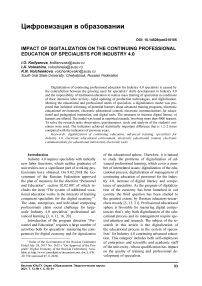Impact of digitalization on the continuing professional education of specialists for Industry 4.0
Автор: Kotlyarova I.O., Voloshina I.A., Volchenkova K.N.
Рубрика: Цифровизация в образовании
Статья в выпуске: 1 т.13, 2021 года.
Бесплатный доступ
Digitalization of continuing professional education for Industry 4.0 specialists is caused by the contradiction between the growing need for specialists’ skills development in Industry 4.0 and the impossibility of traditional education to realize mass training of specialists in conditions of their intensive labor activity, rapid updating of production technologies, and digitalization. Meeting the educational and professional needs of specialists, a digitalization model was proposed that included: informing of potential learners about advanced training programs, electronic educational environment, electronic educational content, electronic communications for educational and pedagogical interaction, and digital tools. The measures to increase digital literacy of learners are offered. The model was tested in empirical research, involving more than 4000 learners. To solve the research tasks observation, questionnaires, study and analysis of the students' outcomes were used. The indicators achieved statistically important difference that is 1.2-2 times compared with the indicators of previous years.
Digitalization of continuing education, advanced training, specialists for industry 4.0, electronic educational environment, electronic educational content, electronic communications for educational interaction, electronic tools
Короткий адрес: https://sciup.org/147234019
IDR: 147234019 | DOI: 10.14529/ped210105
Список литературы Impact of digitalization on the continuing professional education of specialists for Industry 4.0
- Araya D., Peters M.A. Peer-to-peer Networks and Collaborative Learning. E-Learning and Digital Media, 2010, no. 7 (4), pp. 326-327. DOI: 10.2304/elea.2010.7.4.326
- Baran B. Facebook as a Formal Instructional Environment. British Journal of Educational Technology, 2010.
- Baumol. U., Bockshecker A. Evolutionary Change of Higher Education Driven by Digitalization. 16th International Conference on Information Technology Based Higher Education and Training, 2017. DOI: 10.1109/ITHET.2017.8067811
- Chandran D., KempeGowda S. Transforming the Educational System for the Digital Economy. Proceedings of the 18th International Business Information Management Association Conference, 2012, no. 2, pp. 714-720.
- Cheremisina E.N., Kreider O.A., Bela-ga V.V., Kirpicheva E.Y. Training Talent for Digital Economy at Dubna State University. CEUR Workshop Proceedings, 2017, no. 2023, pp.110-114.
- De Vos J. The Neuroturn in Education between the Scylla of Psychologization and the Charybdis of Digitalization? Constructions of Neuroscience in Early Childhood Education, 2017, pp. 20-36. DOI: 10.4324/9781315445120
- Filippi L., Spalanzani A. Using Technology in an E-learning Training Course: the Role of the Student's Personal Environment. International Journal of Business Information Systems, 2012, no. 11 (1), pp. 41-68. DOI: 10.1504/IJBIS. 2012.048341
- Fryer L.K., Bovee N.H, Nakao K. E-learning: Reasons Students in Language Learning Courses don't Want to. Computers and Education, 2014, no. 74, pp. 26-36. DOI: 10.1016/j.compedu.2014.01.008
- Gaebel M., Kupriyanova V., Morais R., Colucci E. E-learning in European Higher Education Institutions. Results of a Mapping Survey Conducted in October-december, 2013, EUA Publications Publ., 2014. 92 p.
- Juceviciene J., Valineviciene G. A Conceptual Model of Social Networking in Higher Education. Electronics and Electrical Engineering, 2010, iss. 6, pp. 55-58.
- Kahlon R.S., Tse M. The Impact of Di-gitalisation in Higher Education Libraries. Proceedings of the 2009 International Conference on the Current Trends in Information Technology, 2009, pp. 184-189. DOI: 10.1109/CTIT.2009. 5423120
- Khalin V.G., Yurkov A.V., Kosov Y.V. Challenges of the Digital Economy in the Context of Globalization: Training of PhDs in Software Engineering in Russia. Digital Transformation and Global Society. Communications in Computer and Information Science, 2017, vol. 745, pp. 120-122. DOI: 10.1007/978-3-319-69784-0_10
- Kuladzhi T.V., Babkin A.V., Murta-zaev S.-Y. Enhancing Personnel Training for the Industrial and Economic Complex in the Conditions of the Digital Economy. Proceedings of 2017 IEEE 6th Forum Strategic Partnership of Universities and Enterprises of Hi-tech Branches (Science. Education. Innovations), January 2018, pp. 67-70. DOI: 10.1109/IVForum.2017.8246053
- Kuzminova Y., Frumin I. Russian Education - 2020: the Model of Education for Economy, Based on Knowledge. IX International Scientific Conference "Modernization of the Economy and Globalization", 2008, no. 1-3, pp. 39.
- Maabreh K.S. The Impact of E-learning Usage on Students' Achievements: a Case Study. International Journal of Knowledge and Learning, 2018, no. 12 (3), pp. 193-203. DOI: 10.1504/IJKL.2018.092312
- Machekhina O.N. Digitalization of Education as a Trend of its Modernization and Reforming. Espacios, 2017, no. 38 (40).
- Morais E., Morais C., Paiva J. Myths and Realities of E-learning: Exploratory Survey of Higher Education Students. E-Learning and Digital Media, 2014, no. 11 (3), pp. 300-313. DOI: 10.2304/elea.2014.11.3.300
- Sahl S., Martens A. Digitalization in Teaching and Learning: The Emperor's New Clothes? Lecture Notes in Informatics (LNI), Proceedings-series of the Gesellschaft fur Informatik (GI), 2016, P-259, pp. 999-1000.
- Tawata A., Yodmongko P., Chakpi-tak N., Sureephong P. Impacts of E-learning on High School Students: the Role of Conventional Interation. International Journal of Science, Mathematics and Technology Learning, 2016, no. 23 (1), pp. 19-27. DOI: 10.18848/2327-7971/ CGP/v23i01/19-27
- The Action Plan of the Programme "Digital Economy of the Russian Federation". Available at: http://static.government.ru/media/ files/k87YsCABuiyuLAjcWDFILEh6itAirUX0.pdf (accessed 11.11.2020).
- Peshekhonov V.G., Gutner I.E., Kole-sov N.V., Belyaev J.V., Kutuzov V.M., Kupriya-nov M.S., Bureneva O.I. Training of Top-class Professionals in the Field of Digital Economy Hardware and Software Platform. Proceedings of 2017 IEEE 6th Forum Strategic Partnership of Universities and Enterprises of Hi-tech Branches (Science. Education. Innovations), January 2018, pp. 7-10. DOI: 10.1109/IVForum.2017.8245955
- Vilkonis V., Bakanoviene T., Tur-skiene S. Readiness of Adults to Learn Using E-learning, M-learning and T-learning Technologies. Informatics in Education, 2013, no. 12 (2), pp. 181-190. DOI: 10.15388/infedu.2013.12
- Zare M., Sarikhani R., Salari M., Man-souri V. The Impact of E-learning on University Students' Academic Achievement and Creativity. Journal of Technical Education and Training, 2016, no. 8 (1), pp. 25-33.


